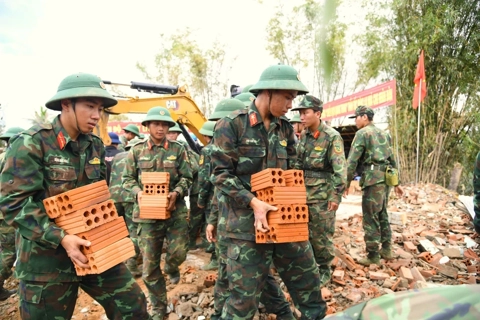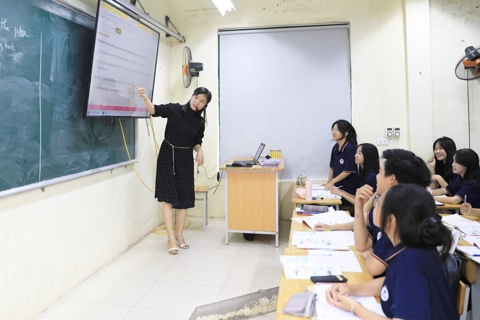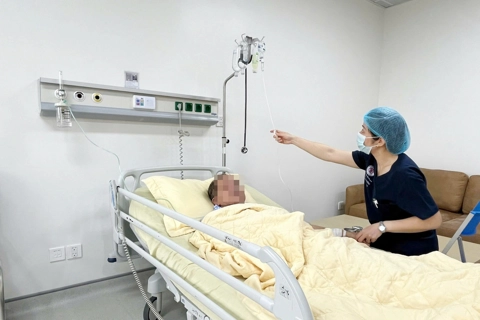Social Affairs
Numerous climate change projects implemented in Mekong Delta
Jun 20, 2018 / 08:20 PM
The European Union (EU) and European countries have been carrying out a number of climate change adaptation and sustainable development projects in the Mekong Delta of Vietnam.
The biggest partners and donors are the EU, Germany, France, Denmark, Sweden, Hungary and Romania, according to the Foreign Ministry’s information released at the Asia-Europe Meeting (ASEM) Conference on Climate Action to Achieving the Sustainable Development Goals – Ways Forward in Can Tho city on June 18-20.
Specifically, the EU implemented a project building a sustainable “tra” fish (catfish) supply chain from April 2013 to March 2017 with total investment of US$2.2 million and another conducting scientific studies on climate change and coastal erosion in Quang Nam, Ca Mau, and Tien Giang provinces in 2016-2017 worth US$1.15 million.
At the same time, the EU also carried out a EUR108-million Energy Sector Policy Support Program to increase the access to sustainable energy in rural, mountainous, sea and island areas in Bac Lieu, An Giang, and Can Tho.
In Ca Mau, the German and Australian governments co-financed US$2.9 million in official development assistance (ODA) for a project under the Integrated Coastal Management and Climate Change and Coastal Ecosystems Program (ICM/CCEP) and authorized the German development cooperation agency (GIZ) to implement it.
The German government also funded Ca Mau EUR1 million to deploy a project on restoration of mangroves through sustainable shrimp farming and emission reduction.
Moreover, Ca Mau province is also making preparations to carry out a project combining coastal protection and mangrove forest land restoration using loans of about US$14.5 million from German development bank KfW.
In Soc Trang province, the German government is carrying out the second phase of the project on natural resources management in coastal areas from September 2014 to August 2018.
Germany also provided a non-refundable aid package of US$5.9 million for Bac Lieu province to conduct two projects on the sustainable management of coastal ecosystems, second phase from 2015 to 2018, and on climate change adaptation through promoting biodiversity.
Meanwhile, the French government offered US$60.6 million in loans, including EUR1 million in non-refundable aid, for the implementation of a project enhancing climate change resilience for areas prone to extreme climate patterns and rising sea level in Can Tho city along with Ninh Binh northern province and the central province of Ha Tinh.
The Danish government supported Mekong Delta provinces to cope with environmental changes through the national target program on climate change in 2009-2015.
Denmark has become the biggest donor with around US$40 million in assisting the Mekong Delta, especially Ben Tre province, in piloting measures to prevent saltwater intrusion prevention and climate change adaptation models such as building flood-proof houses, irrigation networks, salt-to-fresh water treatment factories, and automatic rain gauging stations, contributing to the improvement of the natural disaster warning system.
From 2011, the Danish government has supported Vietnam’s Ministry of Agriculture and Rural Development to implement a project assisting the agricultural sector, including the improvement of post-harvest services for households in the Mekong Delta, which increased the proportion of dried rice to 31 percent of total output from 13 percent in the previous time.
In An Giang province, the Swedish government implemented a project enhancing local capacity and building a scheme for the development of rice husk-fuelled thermal power plants in combination with rice milling plants in 2014-2015 with a budget of US$399,506, including US$ 121,588 in local corresponding capital.
The Romanian government carried out a project piloting the establishment of a biodiversity conservation site for sustainable eco-tourism development in Ba Tri district of Ben Tre province.

Numerous climate change projects implemented in Mekong Delta. Photo: VNA
|
At the same time, the EU also carried out a EUR108-million Energy Sector Policy Support Program to increase the access to sustainable energy in rural, mountainous, sea and island areas in Bac Lieu, An Giang, and Can Tho.
In Ca Mau, the German and Australian governments co-financed US$2.9 million in official development assistance (ODA) for a project under the Integrated Coastal Management and Climate Change and Coastal Ecosystems Program (ICM/CCEP) and authorized the German development cooperation agency (GIZ) to implement it.
The German government also funded Ca Mau EUR1 million to deploy a project on restoration of mangroves through sustainable shrimp farming and emission reduction.
Moreover, Ca Mau province is also making preparations to carry out a project combining coastal protection and mangrove forest land restoration using loans of about US$14.5 million from German development bank KfW.
In Soc Trang province, the German government is carrying out the second phase of the project on natural resources management in coastal areas from September 2014 to August 2018.
Germany also provided a non-refundable aid package of US$5.9 million for Bac Lieu province to conduct two projects on the sustainable management of coastal ecosystems, second phase from 2015 to 2018, and on climate change adaptation through promoting biodiversity.
Meanwhile, the French government offered US$60.6 million in loans, including EUR1 million in non-refundable aid, for the implementation of a project enhancing climate change resilience for areas prone to extreme climate patterns and rising sea level in Can Tho city along with Ninh Binh northern province and the central province of Ha Tinh.
The Danish government supported Mekong Delta provinces to cope with environmental changes through the national target program on climate change in 2009-2015.
Denmark has become the biggest donor with around US$40 million in assisting the Mekong Delta, especially Ben Tre province, in piloting measures to prevent saltwater intrusion prevention and climate change adaptation models such as building flood-proof houses, irrigation networks, salt-to-fresh water treatment factories, and automatic rain gauging stations, contributing to the improvement of the natural disaster warning system.
From 2011, the Danish government has supported Vietnam’s Ministry of Agriculture and Rural Development to implement a project assisting the agricultural sector, including the improvement of post-harvest services for households in the Mekong Delta, which increased the proportion of dried rice to 31 percent of total output from 13 percent in the previous time.
In An Giang province, the Swedish government implemented a project enhancing local capacity and building a scheme for the development of rice husk-fuelled thermal power plants in combination with rice milling plants in 2014-2015 with a budget of US$399,506, including US$ 121,588 in local corresponding capital.
The Romanian government carried out a project piloting the establishment of a biodiversity conservation site for sustainable eco-tourism development in Ba Tri district of Ben Tre province.








